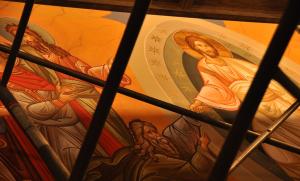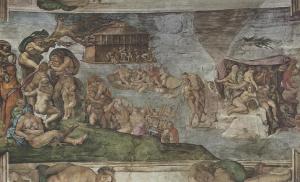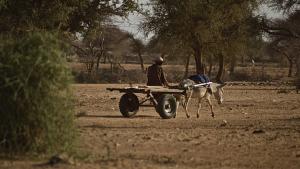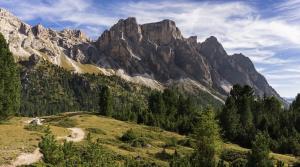 I wrote in my last column about heaven. Specifically, the idea of heaven as the true divine gift present in any object or moment of time. I got there by reading Maximus the Confessor and Ta-Nehesi Coates. But now I’m reading on in Coates’s Between the World and Me, and that faith gets a little more difficult to maintain.
I wrote in my last column about heaven. Specifically, the idea of heaven as the true divine gift present in any object or moment of time. I got there by reading Maximus the Confessor and Ta-Nehesi Coates. But now I’m reading on in Coates’s Between the World and Me, and that faith gets a little more difficult to maintain.
Heaven and the Value of a Life
Coates writes of the deep effect that the murder of his Howard classmate Prince Jones had on him. Jones was an example, for Coates, of a Black man “twice as good” as everyone else, referring to the advice many Black parents give their children. He was a model student, a kind and quiet presence, a born-again Christian. He was killed by a Black police officer from the infamously brutal P.D. of Prince George County, outside of Washington, D. C. The investigation was half-hearted, and the officer returned to work. This, the author tells us, is among the ugliest faces of a political history built on the subjugation of dark-skinned people. Black cops conscripted into the work of reminding America that free Black men are a threat to white supremacy.
Coates attended the funeral, which featured luminaries from the Black church such as Cornel West. He writes that he respects their faith, but knows it is not his. For him, hoping for a heaven for Prince Jones is a way of avoiding the tragedy. “I have no praise anthems, no negro spirituals. The spirit and soul are the body and brain, which are destructible —that is precisely why they are so precious. And the soul did not escape. The spirit did not steal away on gospel wings.”
The book, a long letter to his son, is Coates’s attempt to speak honestly about the injustices of racialized life in the United States. For him, any talk of an afterlife distracts from this reality, and so becomes less than honest. Every slave who died with her body owned by another lost the one shot she had at her own life. “When she dies, the world—which is really the only world she can ever know —ends.” Her slavery was her damnation. Something similar can be said of every lynching victim, every Prince Jones.
Can Dust Praise?
Now, Mr. Coates never asked for the opinion of a white theologian about that day at his friend’s funeral. His experience is not one I can relate to, let alone critique. Still, my theory of publishing is that an author submits her or his account of things for public conversation. What he has to say about life and death is part of a conversation about life and death now. And I will take those words as an invitation to offer an honest and difficult response.
First, I want to say that his challenge makes a lot of sense to me. His book pulses with a celebration of life, and rejects anything that makes life–and death–seem like not such a big deal. It reminds me of several refrains from the Psalms, in fact. “Who can praise you from the grave?” asks Psalm 6. Or:
What profit is there in my death,
if I go down to the Pit?
Will the dust praise you?
Will it tell of your faithfulness?
Hear, O Lord, and be gracious to me!
O Lord, be my helper! (Ps 30)
These are difficult, honest verses that seek a way to trust God without any clear faith in an afterlife. C.S. Lewis wrote about the dense courage of Psalms like this.
So I’d like to say to Mr. Coates, and here I differ somewhat from Lewis’s theology, that I agree. Heaven, conceived as an “afterlife,” can cheapen our value of this life. Christians have a responsibility to challenge anything that cheapens the value of life, from police brutality to easy dismissals of suffering. I might also include a prison system that disregards the one shot a person has at life. Or on-demand abortion pressures that admirably challenge a patriarchy that devalues a woman’s life, but sometimes do so at the expense of any hard public conversations about the life of a fetus.
Heaven as the Abundance of this Life
For that reason, it seems to me that we make a mistake if we go too far with the analogy of heaven as an afterlife. It’s an analogy because it works from something we know, this life, to something we don’t: what lies beyond death. Christian eschatology, the study of such questions, can get obsessed with futurism, as if hope were only about an imagined time that lies ahead.
What if instead hope were about the fullness of the present? Let’s take that terrible moment when the cop shot Mr. Jones. That’s a moment full of fear, desire, anger, and likely other elevated emotions. And for us—for Jones, for the officer—that moment is over. But maybe it’s not for God. Can God receive that moment in its fullness? Can God bless it and invite it to become the burst of life and love and joy that is truly want we want, even if we often want it so poorly?
I’d like to imagine God answering the Psalmist’s prayer something like this:
“No, your body, once it is dust, will not tell of my faithfulness. At least not as fully as it does now, while you are alive to love and laugh and imagine. So I will let this moment of your duress tell, more fully than it knows how, of my faithfulness. I will love this moment as my own creation, and summon it to come close to me. All the hate and fear and violence will burn away, like space junk when it approaches the surface of the sun. And only what I love will come near to greet me. For this is why I made you: so that you might have your one precious life, and have it abundantly. All that is beautiful and good in your irreplaceable existence will have everlasting life in me.”
This is, I think, what Ezekiel learns, when he asks if dry bones can live. If everlasting life means a second chance, and so a relativizing of the hopes and tragedies of this one, then no. But if it means God’s yes overwhelms all the no’s of the world—of the Prince George P. D, of the southern Senators who spent decades protecting the right to lynch Black people? I still have faith in that sort of heaven.
This is something I’ve learned from thoughtfully considering books like James Cone’s The Spirituals and the Blues, Augustine’s Confessions, Kathryn Tanner’s Jesus, Humanity, and the Trinity, and Marilynne Robinson’s heavy and beautiful novel Housekeeping. I discuss all this a bit more in my own most recent book. And my students in Hope for Creation–my class at Seminary of the Southwest— helped me think through these questions more clearly.











